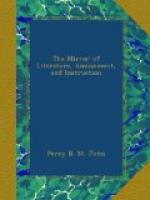[5] Moore’s Life of Byron, vol. ii. 4to. p. 50.
Mrs. Maria Callcott writes, in 1829:—“The tomb now shown as that of Juliet, is an ancient sarcophagus of red granite: it has suffered from the fire which burnt down the church, where it was originally placed."[6]
[6] See a sketch accompanying
an Engraving of Verona, in vol.
xiv.
of the Mirror, p. 321.
Lastly, the accomplished authoress of Characteristics of Women adds her testimony, and illustrates the fondness with which the relics of Juliet are cherished, by noting that she met in Italy a gentleman, who being then “dans le genre romantique,” wore a fragment of Juliet’s tomb set in a ring.[7]
[7] See p. 118 of the present volume.
* * * * *
MONASTERIES.
It is a strange error to conceive that English monasteries, before the dissolution, fed the indigent part of the nation, and gave that general relief which the poor laws are intended to afford.
Hallam.
* * * * *
PIRACY.
Mr. Hallam makes the following excellent observations upon the frequency of piracy in the middle ages:—“A pirate, in a well-armed, quick-sailing vessel, must feel, I suppose, the enjoyments of his exemption from control more exquisitely than any other free-booter; and, darting along the bosom of the ocean, under the impartial radiance of the heavens, may deride the dark concealments and hurried nights of the forest robber. His occupation is indeed extinguished by the civilization of later ages, or confined to distant climates. But in the 13th or 14th centuries, a rich vessel was never secure from attack; and neither restitution nor punishment of the criminals was to be obtained from governments, who sometimes feared the plunderer, and sometimes connived at the offence.”
* * * * *
GOOD EFFECTS OF SALT.
Salt appears to be a necessary and universal stimulus to animated beings; and its effects upon the vegetable as well as animal kingdom have furnished objects of the most interesting inquiry to the physiologist, the chemist, the physician, and the agriculturist. It appears to be a natural stimulant to the digestive organs of all warm-blooded animals, and that they are instinctively led to immense distances in pursuit of it. This is strikingly exemplified in the avidity with which animals in a wild state seek the salt-pans of Africa and America, and in the difficulties they will encounter to reach them: this cannot arise from accident or caprice, but from a powerful instinct, which, beyond control, compels them to seek, at all risks, that which is salubrious. To those who are anxious to gain further information upon this




